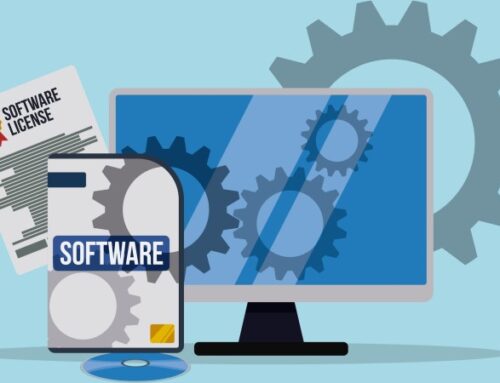Is file sharing illegal? This is a question users ask themselves time and again when they exchange files online. Sharing files in file-sharing networks is illegal if copyrights are infringed. We show you how file sharing can be safe and legal.
What is file sharing?
The term file sharing can be translated into the German language with files, file sharing or shared file access. File sharing describes the principle whereby users share their files with other users on the Internet. They store photos, documents or other files in a folder and upload it to a file sharing service.
With file sharing, different users on the Internet access the same file. The file is not opened together, as we know it from collaborative work processes, but is passed on. File sharing networks are the basis for the exchange of data. They are therefore often referred to as file sharing networks. Components of such a network are either individual computers of users or servers. To use file sharing networks on the Internet, users usually need special programs.
List of known file hosting services
- TeamDrive
- Dropbox
- Google Drive
- iCloud
- Microsoft OneDrive
- WeTransfer
The listed file hosting providers are cloud services that copy data to the cloud server. There the content is available for download. However, users may only offer legal content. To manage data confidentially and in a controlled manner, file sharing via closed user groups is recommended. TeamDrive offers this function and is therefore particularly suitable for file sharing in companies.
Peer-to-peer networks have a bad reputation
In the past, peer-to-peer networks were often used for file sharing. Nowadays, these platforms are no longer a secure alternative for data exchange because they often distribute illegal content. Via a peer-to-peer network (P2P), the uploaded files are available for download by all users. P2P services consist of a network of different computers that are connected and work together.
P2P networks are also used in offices, for file sharing services or for voice communication via Internet-based Voice over IP networks (VoIP). The English word peer stands for equal persons. The peer-to-peer principle thus describes communication among equals. In this context, the term cross-communication also appears.
P2P networks and file sharing networks have a bad reputation. Users use these platforms on the Internet to exchange files illegally. Especially music and movies, but also software change hands without permission. However, this type of data exchange is prohibited because it violates copyright law. Users of file sharing services always risk a warning and expensive penalties for illegal downloads. But there are also variants of file sharing that function completely legally and with impunity.
Legal and illegal file sharing procedures
In a simple sense, file sharing means sharing content with other users on the Internet. Whoever uses file sharing clients to distribute or retrieve illegal copies must expect legal consequences. In the worst case, a warning letter will be left in the mailbox, resulting in an expensive penalty payment. Therefore we recommend to refrain from illegal file sharing. Is file sharing therefore completely forbidden?
Whoever uses file sharing programs does not risk a warning as a matter of principle, but the danger of copyright infringement lies in the details. The principle of file sharing is also used by companies like Microsoft. An update for the Windows 10 software is not done from a central server. The download pulls the necessary files from computers that already have the update installed. This provides high data availability while keeping costs low.
The BitTorrent protocol works similarly. Providers of software distribute their data packages over it, so that users can install the programs on their own terminal equipment. More than a third of the data traffic runs in Germany on-line over the BitTorrent minutes. Here however caution is required. Dubious providers often share content that is illegally protected by copyright.
Anyone who uses this form of file sharing without know-how and ingenuously runs a high risk of receiving a warning. When torrent files are downloaded, new copies of the downloaded content are created unnoticed. They are publicly accessible for other users immediately. Since the source of the download can be traced via the openly visible IP address, there is a high risk of receiving expensive warnings.
How does data exchange work with file sharing programs?
The principle that users exchange their files over the Internet is called file sharing. The data exchange takes place via download portals or file sharing platforms. First, users load the data onto a server via the platform or a software. Other users can then download the data again. In doing so, they immediately redistribute the content when they download it. So they generate a new automatic upload.
The advantage of this function is that the speed of the download is divided among the users during file sharing. It increases because large files are split into several parts. This procedure is unproblematic if the copyright of protected works is preserved during upload and download. Any other procedure is an infringement of copyright and inevitably leads to a warning.
Another way to exchange data is through file sharing tools that host content. These tools are web-based offerings. Users upload larger files and make them available to other users. To do this, they simply send a link to the content. The data can also be protected with a password against access by strangers. The difference between file hosting and file sharing is that in file hosting the upload and download are two strictly separate processes.
TeamDrive as a legal alternative for file sharing
Storing self-created data in a cloud is completely legal. There is neither an infringement of copyright nor a risk for a warning. TeamDrive makes secure file hosting and legal file sharing possible. Content archived in the cloud can be easily synchronized between any number of computers and mobile devices. Access to the hosted files is no problem from any location.
With TeamDrive, users create their own links for sharing. Business partners or colleagues as recipients of the content themselves do not require an account or a login to TeamDrive for downloading. Thanks to end-to-end encryption, data exchange is absolutely secure. As a file sharing system, TeamDrive is in a much better position to protect data from hackers than other file sharing software.




